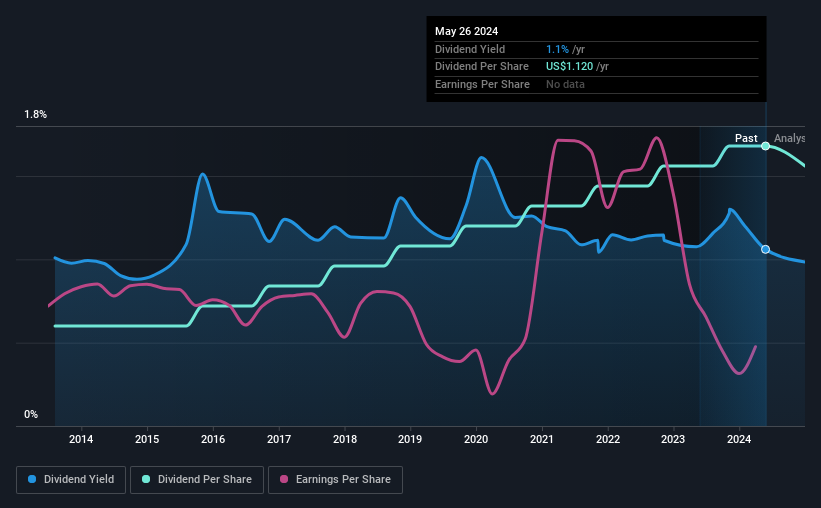- United States
- /
- Consumer Finance
- /
- NYSE:NNI
Nelnet, Inc. (NYSE:NNI) Pays A US$0.28 Dividend In Just Four Days

Some investors rely on dividends for growing their wealth, and if you're one of those dividend sleuths, you might be intrigued to know that Nelnet, Inc. (NYSE:NNI) is about to go ex-dividend in just four days. The ex-dividend date is one business day before a company's record date, which is the date on which the company determines which shareholders are entitled to receive a dividend. The ex-dividend date is important as the process of settlement involves two full business days. So if you miss that date, you would not show up on the company's books on the record date. This means that investors who purchase Nelnet's shares on or after the 31st of May will not receive the dividend, which will be paid on the 14th of June.
The company's next dividend payment will be US$0.28 per share, and in the last 12 months, the company paid a total of US$1.12 per share. Based on the last year's worth of payments, Nelnet has a trailing yield of 1.1% on the current stock price of US$105.68. Dividends are an important source of income to many shareholders, but the health of the business is crucial to maintaining those dividends. As a result, readers should always check whether Nelnet has been able to grow its dividends, or if the dividend might be cut.
View our latest analysis for Nelnet
Dividends are usually paid out of company profits, so if a company pays out more than it earned then its dividend is usually at greater risk of being cut. Fortunately Nelnet's payout ratio is modest, at just 29% of profit.
Generally speaking, the lower a company's payout ratios, the more resilient its dividend usually is.
Click here to see how much of its profit Nelnet paid out over the last 12 months.

Have Earnings And Dividends Been Growing?
Businesses with shrinking earnings are tricky from a dividend perspective. If earnings fall far enough, the company could be forced to cut its dividend. Nelnet's earnings per share have fallen at approximately 7.4% a year over the previous five years. Ultimately, when earnings per share decline, the size of the pie from which dividends can be paid, shrinks.
The main way most investors will assess a company's dividend prospects is by checking the historical rate of dividend growth. Since the start of our data, 10 years ago, Nelnet has lifted its dividend by approximately 11% a year on average.
Final Takeaway
Is Nelnet worth buying for its dividend? Nelnet's earnings per share are down over the past five years, although it has the cushion of a low payout ratio, which would suggest a cut to the dividend is relatively unlikely. In sum this is a middling combination, and we find it hard to get excited about the company from a dividend perspective.
So if you want to do more digging on Nelnet, you'll find it worthwhile knowing the risks that this stock faces. Be aware that Nelnet is showing 2 warning signs in our investment analysis, and 1 of those can't be ignored...
Generally, we wouldn't recommend just buying the first dividend stock you see. Here's a curated list of interesting stocks that are strong dividend payers.
Valuation is complex, but we're here to simplify it.
Discover if Nelnet might be undervalued or overvalued with our detailed analysis, featuring fair value estimates, potential risks, dividends, insider trades, and its financial condition.
Access Free AnalysisHave feedback on this article? Concerned about the content? Get in touch with us directly. Alternatively, email editorial-team (at) simplywallst.com.
This article by Simply Wall St is general in nature. We provide commentary based on historical data and analyst forecasts only using an unbiased methodology and our articles are not intended to be financial advice. It does not constitute a recommendation to buy or sell any stock, and does not take account of your objectives, or your financial situation. We aim to bring you long-term focused analysis driven by fundamental data. Note that our analysis may not factor in the latest price-sensitive company announcements or qualitative material. Simply Wall St has no position in any stocks mentioned.
About NYSE:NNI
Nelnet
Engages in loan servicing, education technology services, and payment businesses worldwide.
Proven track record average dividend payer.
Similar Companies
Market Insights
Community Narratives



